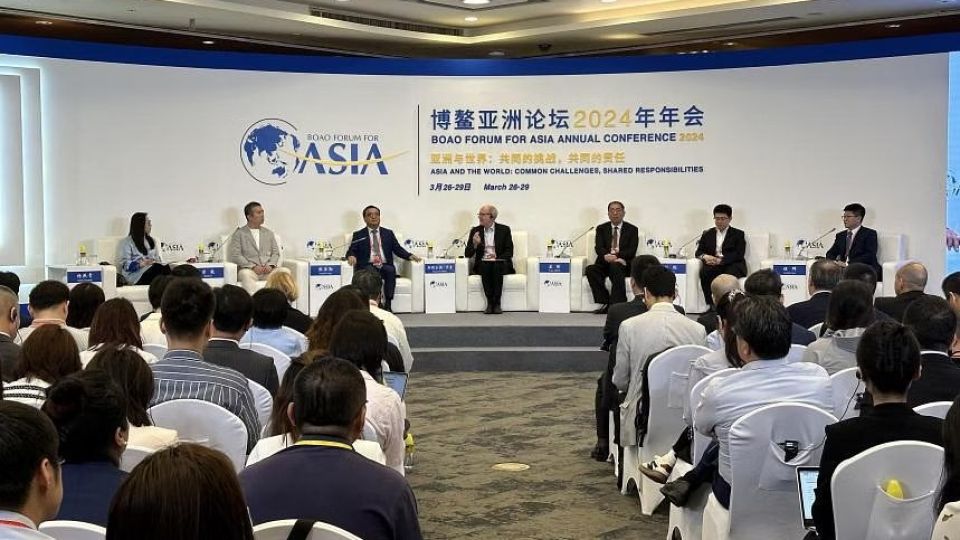March 28, 2024
BOAO – The competition between China and the United States, including in new technology from artificial intelligence (AI) to electric vehicles (EVs), has cast a shadow on an international economic conference.
Panellists at the annual Boao Forum for Asia, which gathers government officials, business leaders and academics to discuss economic cooperation, alluded to the backdrop of great power competition that has increasingly affected domains ranging from economics to technology to climate cooperation.
A clear example is AI, where the February 2024 roll-out of AI-powered video generation tool Sora by the US-based OpenAI generated another round of debate in China about whether its AI innovation capabilities remain behind those of the US.
Asked about this at a session on AI-generated content, British computer scientist Stuart Russell, who is professor of computer science at the University of California, Berkeley, said such AI competition is healthy, and the idea that it is a zero-sum game is “a huge mistake”, as all humans can benefit from the technology if it is safe and capable.
“In that sense, there is no point trying to compete over that technology. It’s like arguing who has more copies of a digital newspaper. It’s a pointless argument, because you can always make more if you need them,” said Professor Russell.
Professor Zeng Yi, director of the Brain-inspired Cognitive Intelligence Lab at the Chinese Academy of Sciences’ Institute of Automation, refused to frame the issue in terms of US-China rivalry.
“The development of AI is a fundamental and enabling technology, and the world is big enough for China, the US and many more countries to find opportunities in building infrastructure and applications,” he told a packed hall.
“But for the potential risks associated with AI, it takes the world to understand and protect humanity,” said Prof Zeng, who is a member of the United Nations Advisory Body on AI that provides recommendations on international governance issues.
At another panel on EVs, Mr Benjamin Simpfendorfer, partner at management consulting firm Oliver Wyman, said the rise of the industry has come at a time when geopolitical factors have become more prominent.
Globalisation has been facing strains, he said, and governments have been more willing to intervene and dictate where production should be located.
China has touted its EV industry as one of the bright spots in its slowing economy, with its EVs accounting for nearly 60 per cent of sales worldwide.
But their overseas expansion has come under pressure, as the European Union is probing whether Chinese EV makers have benefited unfairly from state subsidies.
On the other hand, China on March 26 filed a complaint with the World Trade Organisation against the US over alleged “discriminatory subsidies” for EVs under the latter’s Inflation Reduction Act (IRA) – President Joe Biden’s signature clean energy law.
Singapore Management University professor of law Henry Gao, who specialises in international trade law, said the case is mainly political.
“The IRA is hailed as one of the main political achievements of the Biden administration, so (China’s President) Xi is essentially throwing the gauntlet with a formal WTO case, trying to deter whoever wins the election later this year not to continue the same.
“But I don’t think it will work as being tough on China has become the consensus of both parties (in the US),” he said.
The current edition of the Boao Forum for Asia, billed as China’s version of the annual World Economic Forum meeting in Davos, Switzerland, is being attended by more than 2,000 delegates from over 60 countries and regions.
They are meeting over four days in Boao, a coastal town in Hainan province.
The conference organisers, in a yearly report released on March 26, criticised the de-risking strategy of the US and Europe, saying it “will disrupt global industrial and supply chains, distort market resource allocation, increase economic and trade costs, and add fuel to geopolitical risks”.
This trend of “de-risking”, or reducing strategic dependencies in sensitive areas such as critical raw materials and digital technologies, has contributed to US imports from China dropping 20 per cent in 2023 to US$427.2 billion (S$576 billion).
This meant China was overtaken by Mexico as the US’ top source of official imports for the first time in 20 years.
Another growing controversy, over China’s dominance of global solar manufacturing capacity at 80 per cent of the world’s total, had China’s new climate envoy Liu Zhenmin calling for greater international cooperation and expansion of renewable energy globally.
Debates have been ongoing in Europe over whether the EU should support its ailing solar producers, with the EU producing just 3 per cent of the solar panels it installed in 2023.
Mr Liu, who was appointed in January 2024, said a recent report showed that if Western countries shun China’s clean energy products, the global cost of transitioning to renewables would be 20 per cent higher.
He was likely referring to a February 2024 analysis by energy consultancy Wood Mackenzie, which found that the additional cost amounted to US$6 trillion.
Dr Frederick Kliem, managing director of Episteme Consultants, which advises clients on corporate sustainability issues, believes the solar panel industry need not be an arena for geopolitical competition.
“It doesn’t create a dependency, as some analysts like to call it. Not only can Europe produce them easily on their own and in the US if needed, but they can also easily buy large stocks now.
“There is no political blackmail potential associated with solar panels.”

